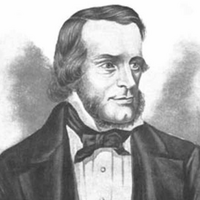Lament for the Death of Eoghan Ruadh O’Neill
“DID they dare, did they dare, to slay Eoghan Ruadh O’Neill?”
“Yes, they slew with poison him they feared to meet with steel.”
“May God wither up their hearts! May their blood cease to flow,
May they walk in living death, who poisoned Eoghan Ruadh.”
“Though it break my heart to hear, say again the bitter words.
From Derry, against Cromwell, he marched to measure swords:
But the weapon of the Sassanach met him on his way.
And he died at Cloch Uachtar, upon St. Leonard’s day.
“Wail, wail ye for the Mighty One. Wail, wail ye for the Dead,
Quench the hearth, and hold the breath—with ashes strew the head.
How tenderly we loved him. How deeply we deplore!
Holy Saviour! but to think we shall never see him more!
“Sagest in the council was he, kindest in the hall,
Sure we never won a battle—’twas Eoghan won them all.
Had he lived—had he lived—our dear country had been free:
But he’s dead, but he’s dead, and ’tis slaves we’ll ever be.
“O’Farrell and Clanricarde, Preston and Red Hugh,
Audley and MacMahon—ye valiant, wise and true:
But—what are ye all to our darling who is gone?
The Rudder of our Ship was he, our Castle’s corner stone.
“Wail, wail him through the Island! Weep, weep for our pride!
Would that on the battlefield our gallant chief had died!
Weep the Victor of Beinn Burb—weep him, young and old:
Weep for him, ye women—your beautiful lies cold!
“We thought you would not die—we were sure you would not go,
And leave us in our utmost need to Cromwell’s cruel blow—
Sheep without a shepherd, when the snow shuts out the sky—
O! why did you leave us, Eoghan? Why did you die?
“Soft as woman’s was your voice, O’Neill! bright was your eye,
O! why did you leave us, Eoghan? Why did you die?
Your troubles are all over, you’re at rest with God on high,
But we’re slaves, and we’re orphans, Eoghan!—why did you die?”
The utterance is supposed to be made by one of O’Neill’s clansmen who is in Ormonde’s camp in the south, and who hears of O’Neill’s death from a messenger who has come into the camp.

